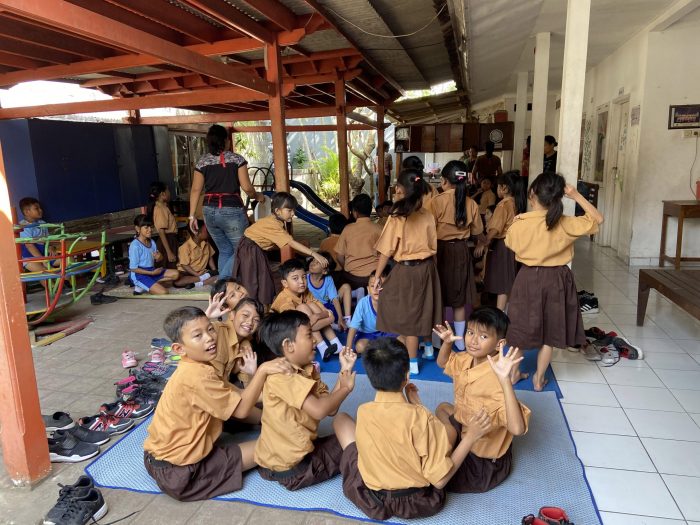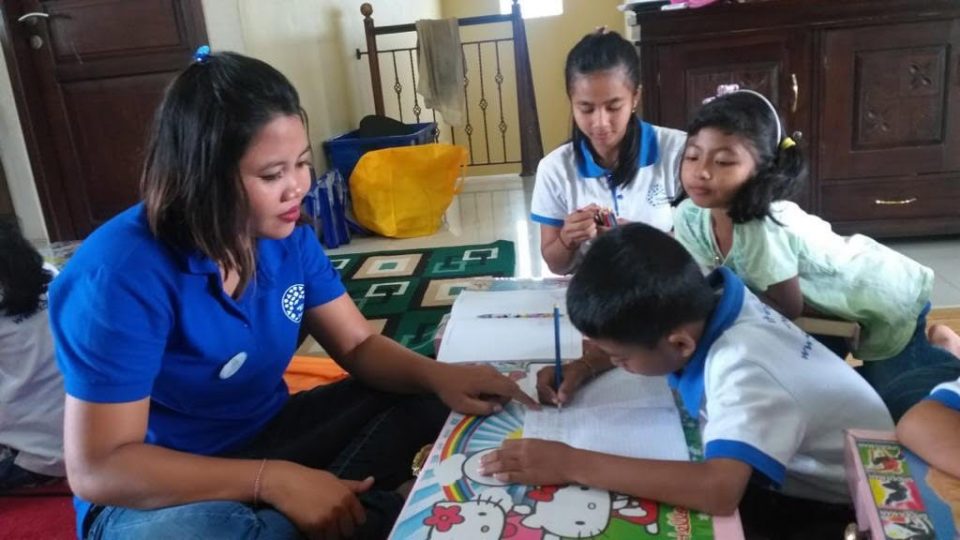Indonesia has made big steps forward when it comes to education. The number of students attending universities is increasing, but there is one group that is getting left far behind: children with a disability.
These children suffer from social stigma, physical barriers, and poor support from government and professionals that make it extremely hard to give them the help they need. Moreover, these children are disadvantaged and they will stay like that simply because there is a lack of means that could help them to get a good education.
Ni Luh Juliana, usually called Ana, works at Kolewa Foundation, a non-profit organisation in Bali. She tells us about the importance of speech therapy and sign language to children with hearing problems. “Can you imagine living a life without communication with others? How dark would your world be?” Ana is referring to the communication problems that deaf children have to face.
The number of children in Indonesia who have hearing problems is over two million, and it is growing. Deafness in childhood has an enormous impact on communication, education, employment opportunities, social life, and quality of life in general, explained Ana.
“When these children and their parents learn sign language, they can communicate with each other. I see a big improvement over the first time I saw these children, when I found them shy, emotional, depressed, easily angered, and upset. By teaching them to speak, they can at least express to others how they feel and what they want. They can also meet children who are in the same situation and make friends. I can see their life change enormously. They are happier, more colourful, more confident, and very enthusiastic,” Ana continued to explain.
A Lack of Support from the Government
There is no well-functioning social system in Indonesia that provides these children with a good education in order to improve their chances of a job, communicate with others, and improve their overall quality of life. The services and facilities for people with disabilities are minimal. Indonesia doesn’t even have a budget for pensions or unemployment benefits, let alone adequate funding to meet the needs of people with disabilities in terms of their health, employment, education, and public access. There is also a lack of information. A lot of infectious diseases are causing illnesses and deaths, which could be prevented simply by knowledge of health issues. For example, hearing problems are sometimes caused by a lack of iodine.
Kolewa Foundation
In Indonesia, there are several projects and non-governmental organisations that help these children, for example, by providing school funding for deaf children and supporting special schools for them. One of these organisations is Kolewa Foundation and one of their projects is to help children with hearing problems. After learning sign language and getting speech therapy, there are now already 18 students who are ready to go to school. They are attending a special school for the deaf in Denpasar, Bali. Kolewa finances the registration fees, the uniform costs, school books, and annual fees for use of the school building. Apart from that, Kolewa finances a school bus with a driver who drives the children to Denpasar and back to their homes.
Ana talked about the way she teaches.
“I teach them speech therapy and sign language in a playful way, to make them more eager to learn”
For example, I teach them signs by doing a dance together. Also, I teach them yoga to make them relaxed and able to concentrate. It is a big challenge to teach children who cannot hear or can only barely hear, and also to teach them how to talk. But when they pronounce a word correctly, they are so happy and motivated. It is such a rewarding job.”
The children learn the official Indonesian sign language. Kolewa developed two books for the children with 150 different signs in it, including illustrations and drawings about how to perform the gestures.
Ana also focuses on guiding the parents in communication with their child and acceptance of the situation. “When the parents also know sign language, they can communicate more easily with each other. Moreover, parents can help their children with their homework. There is a focus on a positive approach to the problem and to offer solutions.”
Stigma Around Deafness
The difficulties associated with acceptance of the situation that Ana mentioned is because of the taboo about people with hearing problems. In Indonesia, people with disabilities such as deafness are mostly considered an embarrassment, or even worse, to having been punished by God. On the islands of Bali and Java, it is believed that disabled people are possessed by a supernatural spirit. Therefore, people do not feel much empathy for people with disabilities.
This judgment and stigma affect the lives of these people and especially young children. They are not encouraged to develop personally. They do not go to school: they stay uneducated, unskilled, and live in isolation. “They are so lonely, because of the isolated life they lead. They hide from their family and have no friends at all. As soon as they start to learn some words, it gets better and they finally see the joy in life. The next step for these children is to go to school and learn other skills. Their chance of landing a job in the future is way bigger now,” said Ana.
See: Kolewa: The Star of Seminyak




